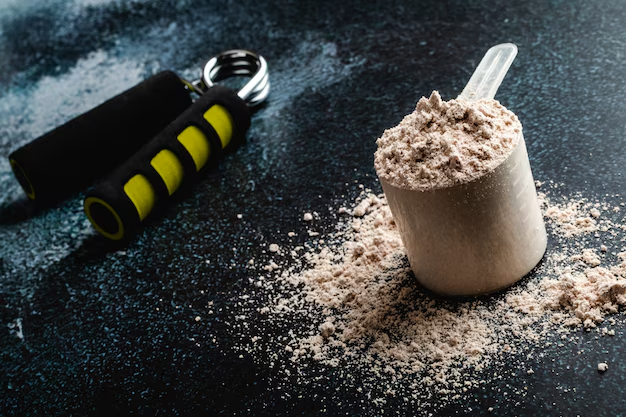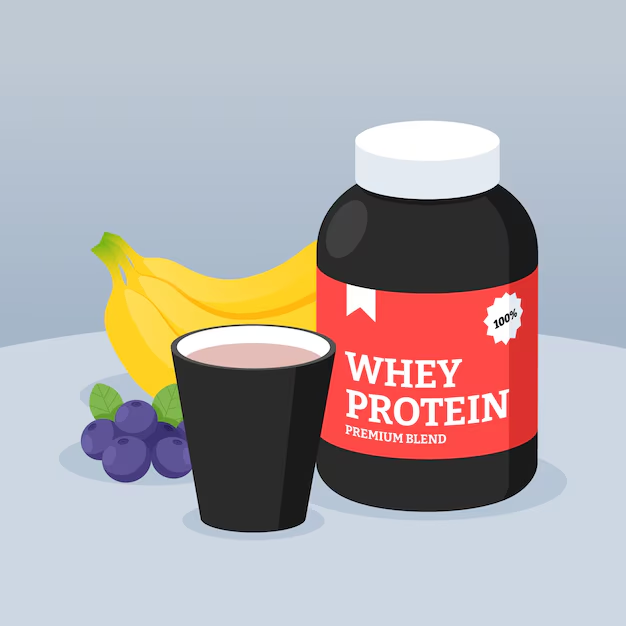Protein powder plays a vital role in muscle building. Protein is the building block of muscles, helping repair and grow muscle tissues after workouts. For fitness enthusiasts and athletes, protein powder has become a go-to supplement to meet protein needs conveniently.
Available in various forms, such as whey, casein, and plant-based options, protein powders cater to diverse dietary requirements. But how effective are they for muscle growth? Let’s dive into the science and determine whether protein powder truly supports your muscle-building goals.
The Role of Protein Powder in Muscle Building
Protein powder is more than just a convenient source of protein—it’s a tool to help muscles recover and grow. After intense exercise, muscles undergo tiny tears. Protein helps repair these tears, making muscles stronger and larger over time. This repair process is called muscle protein synthesis, and adequate protein intake is critical for it.
Is Protein Powder Good For Building Muscle?
Yes, protein powder is excellent for building muscles. It supplies high-quality proteins quickly. This is especially beneficial after workouts when the body’s ability to absorb nutrients is heightened.
The amino acids in protein powders, particularly leucine, act as triggers for muscle repair and growth. Research shows that consuming protein after workouts enhances recovery and increases muscle mass over time.
Types of Proteins in Protein Powder
Not all protein powders are the same. The most common types include:
- Whey Protein: Fast-absorbing and rich in essential amino acids, especially leucine. Ideal for post-workout recovery.
- Casein Protein: Slow-digesting, making it a great option for nighttime use to support muscle repair during sleep.
- Plant-Based Proteins: Derived from sources like pea, rice, or soy, these are excellent for vegans or those with dairy allergies.
Each type has its strengths, and your choice depends on your dietary needs and fitness goals.
Do You Need Protein Supplements?
Many wonder if protein powders are a necessity or just a marketing gimmick. The answer depends on your dietary habits, fitness level, and goals.
Do I Need Protein Supplements for Muscle Growth?
The human body requires sufficient protein to build and repair muscle. Supplements may not be essential if your diet already meets your protein needs through foods like chicken, eggs, fish, or legumes.
However, supplements like protein powder is a practical solution for individuals who struggle to hit their protein targets. It provides a concentrated dose of protein without the need for meal prep or extra calories.
Is Protein Powder Good for You?
Protein powder can be a healthy addition to your diet when used correctly. It is generally safe, but quality matters. Look for brands with minimal additives and a high protein content per serving.
For those with dietary restrictions, protein powders are a versatile option to ensure sufficient protein intake. That said, consuming protein powder in moderation is important as part of a balanced diet.
Protein Powder and Muscle Gain
To maximize muscle gain, understanding how and when to use protein powder is crucial. Timing, portion size, and overall nutrition all play a part in achieving optimal results.
Do Protein Shakes Help Build Muscles?
Yes, protein shakes are effective for muscle building. They provide essential amino acids that the body needs to repair and grow muscle tissues. Drinking a protein shake after workouts is particularly beneficial as it supports faster recovery. Studies show that pairing protein intake with strength training leads to significant increases in muscle size and strength.
To Read: 120 Grams of Protein: Does It Help with Weight Loss?
When Should You Take Protein Powder for Muscle Gain?

The timing of protein intake can influence its effectiveness. Here are some optimal times to consume protein powder:
- Post-Workout: Within 30 minutes after exercise is the most effective time. This window allows your muscles to absorb nutrients quickly for recovery.
- Morning: After an overnight fast, a protein shake can kickstart muscle recovery and repair.
- Before Bed: Casein protein is ideal for nighttime use as it releases amino acids slowly, promoting muscle repair during sleep.
Benefits of Protein Powder
Protein powder offers numerous benefits for muscle gain and overall health:
- Convenience: Quick and easy to prepare, making it perfect for busy lifestyles.
- Controlled Calorie Intake: Provides protein without excess fats or carbs.
- Versatility: Can be added to smoothies, oatmeal, or even baked goods.
- Improved Recovery: Speeds up muscle repair, reducing soreness and fatigue.
- Customizable: Options like lactose-free or vegan powders cater to individual needs.
How Much Protein Do You Need?
Getting the right amount of protein is key to gaining muscle. The amount you need depends on factors like age, weight, activity level, and fitness goals.
Daily Protein Requirements for Muscle Gain
For most individuals aiming to build muscle, consuming 1.6 to 2.2 grams of protein per kilogram of body weight per day is effective. For example:
- A person weighing 70 kg (154 lbs) should aim for 112–154 grams of protein daily.
How Much Protein Powder Per Day Can You Gain Muscles?
Protein powder is a supplement, not a replacement for whole foods. Typically, 1–2 scoops (20–40 grams) per day can help fill any dietary gaps. However, relying solely on protein powder isn’t recommended. Balance it with protein-rich foods like chicken, eggs, or beans.
Timing is also important. Use protein powder post-workout or during times when getting protein from food is difficult. This ensures your muscles have a steady supply of nutrients for recovery and growth.
Types of Protein Powders

Choosing the right protein powder depends on your goals, preferences, and dietary needs. Here’s a breakdown of popular options:
1. Plant-Based Protein Powder
Derived from sources like peas, rice, or hemp, plant-based protein powders are ideal for vegans or those with dairy intolerance. They’re rich in fiber and often fortified with all essential amino acids.
2. Muscle Milk Protein Powder
Muscle Milk contains a blend of proteins like whey and casein. It’s marketed as a complete solution for muscle recovery and energy. It often includes added vitamins and fats, making it a good choice for those needing extra calories.
3. Collagen Protein Powder
Collagen protein supports joint health and skin elasticity. While it’s not as effective for muscle building due to its low leucine content, it’s great for overall recovery.
4. Whey Protein Powder
Whey is the gold standard for muscle building. It’s rich in essential amino acids and absorbs quickly, making it perfect for post-workout use. Whey isolate and hydrolysate are purer forms, ideal for those looking for low-lactose options.
5. Pea Protein Powder
Pea protein is a popular plant-based option. It’s high in BCAAs (branched-chain amino acids) and easily digestible. It’s a great choice for those allergic to dairy or soy.
6. Orgain Organic Protein Powder
Orgain offers organic, plant-based protein powders with minimal additives. They’re suitable for individuals seeking clean, non-GMO protein sources.
7. Hemp Protein Powder
Hemp protein is packed with fiber, omega-3 fatty acids, and essential nutrients. While its protein content is lower than whey or pea protein, it’s a nutritious option for overall health.
8. Bone Broth Protein Powder
Made from animal bones and connective tissues, this powder is rich in collagen and minerals. It supports joint health and recovery but isn’t ideal as a primary source of protein for muscle growth.
9. Ghost Protein Powder
Ghost is a lifestyle brand offering whey-based protein powders in unique flavors. It combines good taste with high-quality protein, appealing to fitness enthusiasts.
10. Garden of Life Protein Powder
Garden of Life produces organic, plant-based protein powders fortified with probiotics and digestive enzymes. They cater to individuals looking for a healthy, gut-friendly option.
Each protein powder has unique benefits. Your choice should align with your fitness goals, dietary preferences, and health needs.
To Read: Food is Medicine: Dietary Changes for a Healthier and Happier You
Potential Side Effects of Protein Powder
Protein powder is generally safe, but excessive use or low-quality products can cause issues. Here are some common side effects:
Digestive Issues
Many people experience bloating, gas, or diarrhea when consuming protein powders, especially whey. This is often due to lactose intolerance or added fillers.
Kidney Strain
For individuals with pre-existing kidney problems, excessive protein intake can put extra strain on the kidneys. However, this is rarely a concern for healthy individuals.
Allergies and Sensitivities
Some powders contain allergens like dairy, soy, or gluten. Choose products labeled hypoallergenic if you have sensitivities.
Weight Gain
While protein powders can aid muscle building, consuming too much may lead to unwanted calorie intake and weight gain.
To avoid these issues, use high-quality protein powders, follow recommended dosages, and consult a healthcare provider if you have underlying health conditions.
FAQs
What is the best protein powder for beginners to gain muscle?
Whey protein is ideal for beginners due to its fast absorption and high amino acid content. It’s versatile, easy to mix, and supports muscle recovery and growth effectively. Always choose high-quality brands for best results.
Is protein powder necessary for muscle growth?
Protein powder isn’t essential for muscle growth but is a convenient source of high-quality protein. It’s helpful for meeting protein requirements, especially for individuals with busy schedules or those struggling to consume enough dietary protein.
Do I need protein supplements?
If your dietary protein intake is insufficient to meet your fitness goals, you may need protein supplements. They provide a quick and easy way to boost protein consumption and support muscle repair and growth.
Can I gain muscle by drinking protein shakes?
Yes, protein shakes can help build muscle when combined with resistance training and a balanced diet. They provide essential amino acids that support muscle recovery, repair, and growth effectively.
Conclusion
So, is protein powder good for building muscle? Yes, when used wisely. It provides a convenient, high-quality source of protein that supports muscle growth, recovery, and overall health. However, it’s important to balance supplements with a nutritious diet and proper exercise routine. Choose the right protein powder for your needs, and enjoy the journey to achieving your fitness goals.

